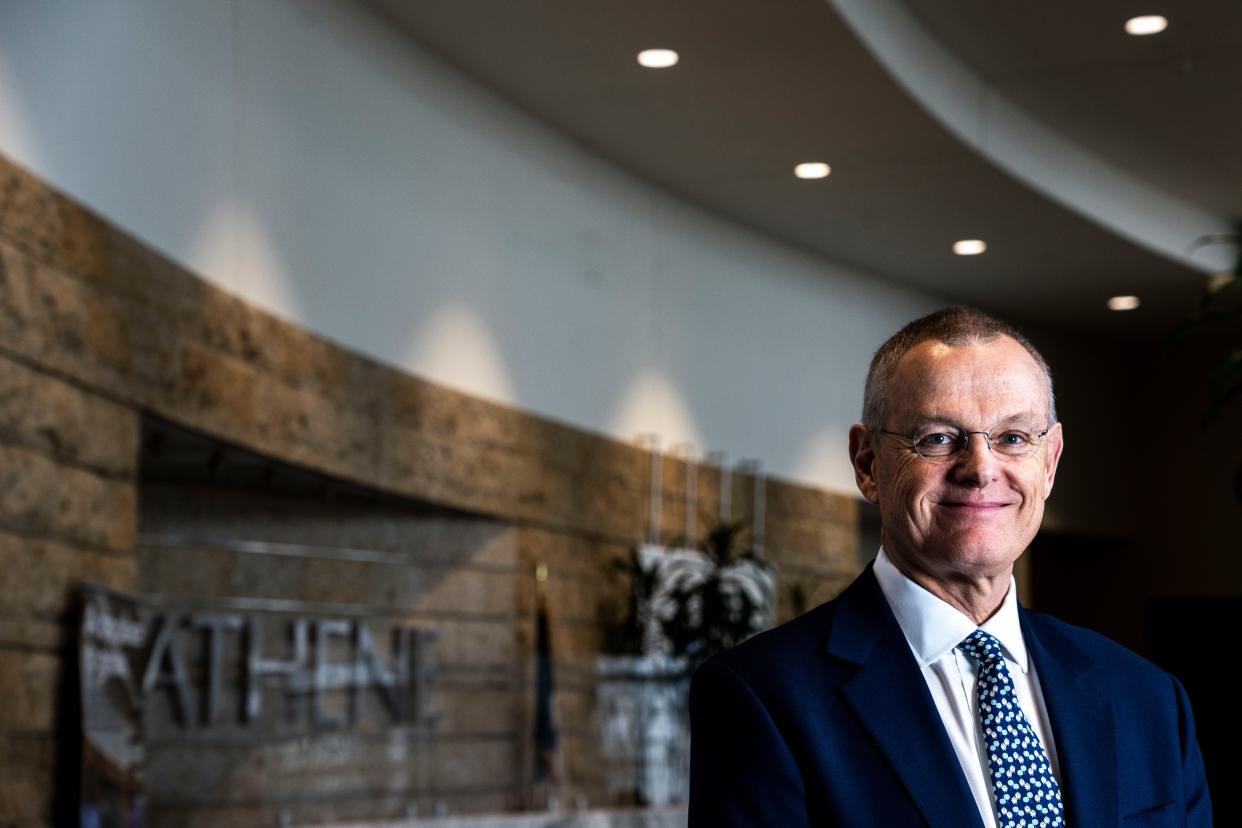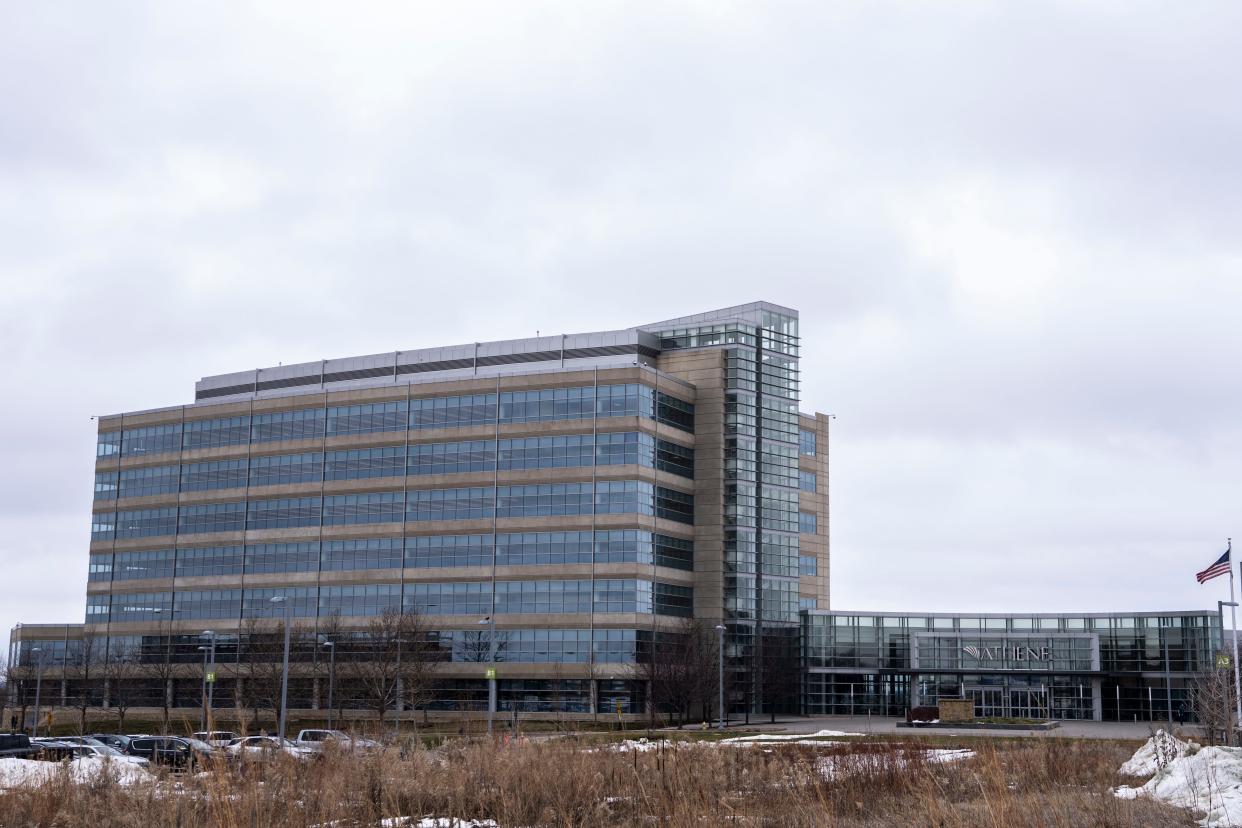While growth flattens for most Des Moines metro financial firms, private equity booming

Last in a series
Athene President Grant Kvalheim does not buy complaints about Iowa’s tight labor market.
“Employment grows when your business grows,” he recently told the Des Moines Register. “People are saying, ‘We can’t grow our business because we can’t find the people.’ I fundamentally don’t believe that. I don’t believe that in Iowa, and I don’t believe that in general.”
That may be news to rival executives and business lobbyists in the state, who have long complained that Iowa’s slow population growth has restrained corporate profits. Some have told the Register that Iowa’s tight labor market is to blame for the metro’s loss of finance jobs since 2017, reversing a decades-long trend of rapid growth.
Kvalheim has a different take: “You don’t need people if you’re not growing.”
Amid the finance industry's slowdown in the metro, Athene is a bright light. A division of the private equity giant Apollo Global Management, it has expanded into the country’s largest annuity provider since opening its U.S. headquarters in West Des Moines 11 years ago.
From 2015 to 2022, according to financial filings, Athene’s total annuity liability has grown from $56.2 billion to $161.3 billion. The metric is a sign of Athene’s customer growth.
Since 2017, Kvalheim said, the company has increased local headcount to 1,620 from 1,000. He said the company filled its office building at 7700 Mills Civic Parkway, and executives are now renting extra space on Jordan Creek Parkway.
“We offer an incredibly attractive place to work for people in the Des Moines area,” he said. “Why wouldn’t you want to join a company that’s winning in the marketplace, becoming a market leader?”
Athene’s success underscores how much the metro has come to rely on private equity firms over the last decade.
In the wake of the 2007-09 recession, companies like Apollo have swarmed the life insurance and annuity market that dominates Des Moines financial sector. These companies have found a steady source of revenue, which they invest in assets like real estate, private loans and infrastructure projects.
Traditional life insurers, in turn, found a way to escape the business, which grew slowly under their management. They usually invested money from customers into government and corporate bonds, earning a profit on the spread between what they owed and what the bonds paid.
As the Federal Reserve kept interest rates near zero in the wake of the recession, life insurers struggled to earn profits. Des Moines’ Principal Financial Group was one such company, exiting the individual life and some annuities businesses in 2021.
Private equity firms’ life and annuity assets increased from $50 billion in 2012 to $724 billion in 2022, according to the ratings agency AM Best. Their market share increased to 9% from 1% during that time.
Private equity-backed insurers also have taken over pensions from traditional providers, like Lockheed Martin Corp. and Alcoa Corp.
Locally, in 2021, KKR & Co. bought a majority stake of The Global Atlantic Financial Group, which operates an office in the Davis Brown Tower at 215 10th St. downtown. KKR bought the rest of the company last month.
Blackstone and Des Moines-based F&G reached an agreement for the investment firm to manage the insurer’s assets in 2017.
Brookfield Asset Management, meanwhile, reached an agreement to buy West Des Moines’ American Equity Investment Life Insurance Co. last July. The deal has not closed, and a Brookfield spokesperson declined the Register’s interview request.
But in an investor presentation in September, Brookfield Insurance Solutions CEO Sachin Shah said the company plans to grow its annuity assets to about $250 billion from $100 billion.
“We’re going to be one of the top leaders in the market,” he said.
Athene grew in Des Moines metro in part because of Iowa regulators

While local financial activities job growth has slowed, the Des Moines metro is still dense with the kinds of experts that insurers need.
As of 2022, according to the U.S. Bureau of Labor Statistics, no metro in the country had more insurance underwriters, financial examiners or financial risk specialists per capita. The metro ranked third in actuaries per capita, behind Bloomington, Illinois, and Hartford, Connecticut
Kvalheim said Apollo centered its U.S. insurance operations in the metro because of that talent base and the state’s regulators. He said Iowa Insurance Division employees approve Athene’s applications in a matter of days or weeks, while those in other states take up to a year.
More: Did Iowa exercise due diligence in opening door for insurance executive with checkered past?
He said regulators in other states made “unreasonable” demands as Athene expanded after its formation in 2009. He declined to discuss specific problems, but New York’s regulators investigated private equity firms amid Athene’s rise.
In 2013, the year Athene entered the Iowa market with its $2.6 billion acquisition of Aviva USA, the New York Department of Financial Services subpoenaed several private equity firms to obtain emails, investor pitchbooks and other material to see whether the companies enriched themselves at consumers’ expense.
The subpoenas did not lead to enforcement action. But that same year, the regulators published a report on “Shadow Insurers” ― firms, known as captives, that enter reinsurance agreements with sister companies.
The captives are often based offshore or in U.S. states with light regulations, and the main insurance firms unload policies to the captives. The main firms appear to have less risk, allowing them to write more policies. The captives are often in regions that don’t require them to publicly disclose their audited financial reports. (Athene has long reinsured its own policies in Vermont- and Bermuda-based subsidiaries.)
Athene and New York regulators butted heads again in 2018, when the state fined an Athene subsidiary $15 million for failing to provide required information to life insurance policyholders. Athene had contracted that work to another company, according to the Wall Street Journal, but the regulators held Athene responsible.
More: Want to cross the Raccoon River? Cyclists and pedestrians soon can with Athene bridge
The state also fined Athene $45 million in 2020 after an unlicensed subsidiary allegedly conducted insurance business in New York.
In Iowa, Kvalheim said the company built a strong relationship with state leaders. After announcing its purchase of Aviva USA, Kvalheim and Athene founder Jim Belardi met with then-Gov. Terry Branstad and Iowa Economic Development Authority Director Debi Durham.
Kvalheim said Branstad congratulated Athene on the acquisition and asked what help the company needed from state leaders.
“We were just very impressed,” he said. “That initial impression has proved out to be true.”
Athene wants employees in the office, where the action is
Athene’s growth is in step with the general expansion of private equity firms throughout the United States. According to Pitchbook, total assets held by private equity firms increased from $1.5 trillion in 2008 to $8 trillion last year. The firms increasingly own real estate, invest in infrastructure and offer private loans.
Critics have warned that, compared to loans from regulated banks, private lending markets are opaque and difficult to value.
Leaders at Athene and Apollo have frequently rebuffed such criticism. An Apollo spokesperson told the Wall Street Journal in 2022 that 95% of the company’s fixed-income portfolio consists of investment-grade — or safe — assets.
A review by AM Best found that private equity-linked insurance and annuities companies generally invest in riskier assets than their traditional counterparts. At the same time, AM Best also reported that the newcomers tend to hold more money in reserve, a sign that the companies are being prudent.
“Some have tried to characterize (our strategy) as riskier,” Kvalheim said. “We think it’s appropriate, given the liability structure we have.”
Unlike some local companies that have allowed employees to work from home, Athene requires workers to report to the office four days a week. Kvalheim said local employees see opportunities to advance their careers at Athene.
“When you’re a business of rapid growth and you’re promoting from within, as opposed to a company that is not even growing ― or your business is shrinking ― that's pretty obvious.” he said.
F&G grows in Des Moines with Blackstone partnership

In 2013, the same year Athene closed its deal for Aviva USA, F&G announced that it would move its headquarters from Baltimore to Des Moines.
Then-CEO Lee Launer told the Register at the time that the company targeted the metro for its deep talent pool and its “sophisticated regulatory approach.” A company spokesperson pointed out that many other annuity providers were in the area, indicating that Iowa regulators would understand the ins and outs of the business.
At the time, the company planned to add 50 employees in Iowa by 2016. F&G has been on a much faster expansion plan in recent years.
Chinh Chu, a former Blackstone private equity executive, bought F&G in 2017 through one of his companies, CF Corp. At the same time, F&G reached a deal for Blackstone to manage its assets in return for a fee.
Fidelity National Financial, a title insurance company, bought F&G in 2020. But the Blackstone management deal remains in place.
According to an investor presentation, Blackstone is investing F&G’s money in private loans, bonds, infrastructure projects, commercial real estate and airplanes.
“We had a 400-pound big brother on the playground,” F&G CEO Chris Blunt said of Blackstone.
From 2018 to 2022, F&G’s balance increased from $26.7 billion in assets to $43.6 billion.

In 2019, the company announced it would move from an office at Two Ruan Center to a new space at 801 Grand. F&G estimated that the relocation would cost $9.4 million and would increase its footprint from about 50,000 to 83,000 square feet.
Blunt recently told the Register that local employment is up. Since he joined the company in December 2018, he said, F&G has hired about 450 Des Moines-based workers, bringing the total local headcount to about 650.

At the same time, he estimated that the company hired 400 more employees in other parts of the country. Blunt said the company couldn’t find all the employees it needed locally as it scaled up quickly, so it looked elsewhere for investment professionals.
“There’s just a limit to how many people you can pull out of your competitors,” he said.
Unlike Kvalheim, Blunt said he does think Iowa’s tight labor market presents some challenges. And F&G allows employees to work remotely, unlike Athene. But Blunt said many workers do come into the office, particularly when company leaders want to address the staff.
He is also optimistic that local companies will reverse recent struggles in Des Moines’ financial labor market.
“You’re going to see that line (of annual job growth), at least on the insurance portion, turn back positive,” he said.
Tyler Jett is an investigative reporter for the Des Moines Register. Reach him at tjett@registermedia.com, 515-284-8215, or on Twitter at @LetsJett. He also accepts encrypted messages at tjett@proton.me.
This article originally appeared on Des Moines Register: As Des Moines metro's financial sector slows, Athene, F&G buck trend
